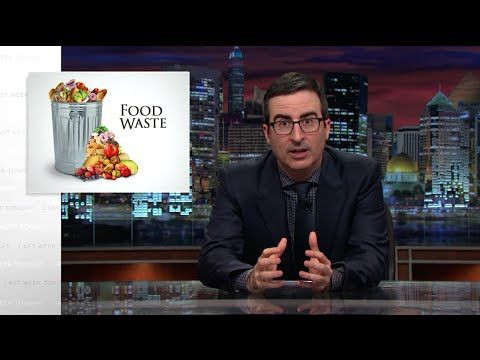John Oliver Exposes Food Waste In America: Billions Of Dollars In Food Wasted While Millions Of People Go Hungry

Imagine walking out of the grocery store with four bags worth of food and then dropping one of those bags in the parking lot just before driving home. That’s what food waste is like — a nonsensical acquisition and wasteful scattering of uneaten food.
John Oliver outlines the problem just under half an hour in his newest segment on Last Week Tonight, which aired on Sunday. In it, he discusses how Americans are throwing out 50 percent more food than they did since the 1970s. That adds up to 20 pounds of food per person every month, meaning each household throws out 15 to 20 percent of the food they purchase. The waste of food, money, and environmentally valuable resources, such as farm land and tons of water, is a web of complicated consumerism.
In 2013, 49.1 million people lived in food insecure households, according to the U.S. Department of Agriculture, which means at one point they were unable to feed themselves and/or their children. In America, up to 40 percent of the food produced is thrown out, adding up to $165 billion worth of food every year. The ironic juxtaposition between throwing out billions of dollars of food and having millions struggling to put food on the table for their family is a sad reality for Americans, according to Oliver.
But what to do with all the food? A common misconception is there are too few options because the food can’t be donated. Grocery stores, restaurants, and other businesses are afraid they’ll be sued if someone becomes sick from the donation, but according to the Bill Emerson Good Samaritan Food Donation Act, that’s untrue. A person donating food “shall not be subject to civil or criminal liability” for donating food that the person or organization believes to be fit for human consumption.
However, it doesn’t come without a cost to businesses, who have to package and coordinate shipping for leftover, uneaten, or non-purchased food. Which is why in February, Congressman Rep. Erik Paulsen (R-Minn.) proposed H.R.644 “Fighting Hunger Incentive Act of 2015,” to give all businesses, big and small, a tax break incentive to donate. Unfortunately, the Senate bill passed after rounds of edits and ended up without the inclusion of the original tax incentive proposal.
As Oliver explained:
When the bill got to the Senate they — and I honestly did not know this was possible — removed everything from inside the bill, retitled it the, ‘Trade Facilitation and Trade Enforcement Act of 2015’ and refilled it with completely different language concerning border control and U.S. Israeli relations. Which meant, yes, H.R. 644 did pass, just with a completely different title and completely different contents.
Oliver brokers the political discourse with his conventional humor and provides his viewers with an analogy in an effort to summarize America’s cyclical food waste problem.
“It’s like going to a restaurant, ordering a veggie burger and having the waiter say, 'here you go, we made it out of meatloaf and we call it a waffle,” Oliver said. “And then, you can’t even say ‘Well, I don’t want this, give it to someone who needs it’ because they can’t, because they don’t know whether or not they’ll get a f---ing tax credit for it. And look, the insane thing is everyone basically agrees small businesses should get tax incentives to donate food so we have to find a way to pass that. But even if we do, it will be one small part of what needs to be a much bigger solution.”



























